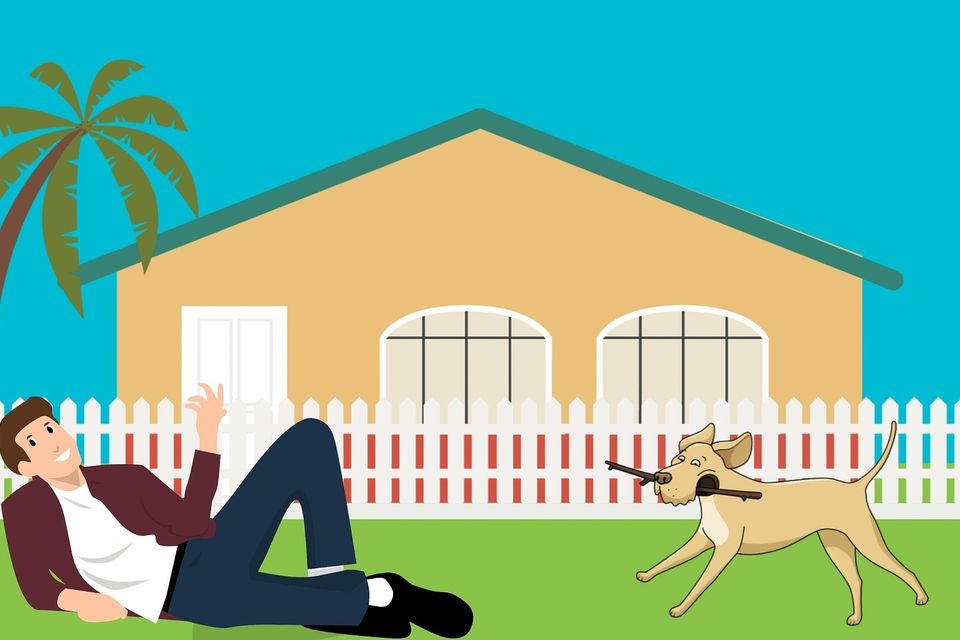You can’t always
see everything online
Why it’s important to have a Real Estate agent in your corner when buying a home.
The Importance of Home
Americans have long seen the purchase of a house as part of the national dream. It is a long-term aim for many and the desire to buy a home is so strong that most Millennial-aged people name the purchase of a house to be their most immediate and important goal. The procurement of a home symbolizes a sense of accomplishment or achievement. Home is an expression of who we are and our lifestyle choices. Often people buy a house that reminds them of their childhood and brings a nostalgic sense of a happy time to everyday life. Buying a house is not just purchasing a place to live, it is a lot more than that. It is buying a place to build a life; therefore, it can be an emotional process.
Any major purchase can involve emotions, however there are other practicalities to consider when buying a residence. A home, along with where it is located such as on an acreage, urban area, cul-de-sac, places us within the larger framework of that societal community. Your domicile dictates how you live your life through your commute, your access to food and entertainment, your relationships with neighbors, and your budget. Therefore, buying a house is a functional and financial exercise as well as an emotional one.
Buying a house is aptly considered “a life event” because of the vast emotional and financial commitment involved. Most people understand that real estate agents help with paperwork, but much more than that, your agent holds a bank of knowledge. She or he will use that knowledge to help you navigate the delicate balance between your emotional and financial needs to assist you in finding that perfect home.
Information Gathering
People often overlook the agent’s knowledge at first, typically waiting to consult with one until it is time to look at houses. This is because so much information is at our fingertips on the internet. Given how important buying a home is, it is no wonder people want to do some research as they begin this endeavor. This is especially true for the information-hungry Millennial generation who tend to spend quite a bit of time researching on the web. Information gathering is even more important if moving a far distance or to another state and indeed, a lot of information can be instantaneously found on the internet. Within a few moments, you can see what the outside of a house looks like and what the interior style might be. Using dedicated websites, the determined researcher can glean a lot of information regarding general information about the state, city, safety of neighborhoods, proximity to restaurants, good school districts, local markets (comparables) and much more. In fact, there is so much information out there, multiple sites may need a visit as no one single website can possible contain all the information desired. However, it is important to remember, you can’t see everything online. Think of your agent as your own personal internet search machine for your particular situation. And unlike the web, your realtor will address your unique needs based on your personal circumstances and not on some formula. No computer can provide the human touch in combining all that knowledge and applying it in your distinctive context. Your agent will give you information right from the beginning that you cannot see online.
State and Municipal Level
When moving to a new state, many things need to be considered. There are different laws, differences in property tax and income tax that you may not think to look up when looking for a home. Each state has differences in lifestyle as well. An internet search may not capture all the nuances of each particular state. For example, an agent in Florida will tell you not to walk your small dog near that pond in the back during certain times of the year because of alligators. In states with a colder climate, your agent may tell you that you should consider a garage that faces south so that the sun melts the snow off your driveway rather than having to shovel it. Even a move within a larger state can sometimes catch you unaware. When moving from central California to the southern region, I was glad my agent warned me to allow extra commute time because of the dense fog in the morning that doesn’t burn off until after rush hour. I had to re-calculate the best neighborhood because driving time, as I informed her, was an important factor to me!
Drive time is a common concern when relocating and an agent can tell you about how that particular city operates. Sure, you can look online and note that a particular house is 5 miles from your job but what you can’t see online and what your realtor will let you know, is that rush hour in that part of the city will make the drive 20 minutes longer than expected. If on your computer search you find a house next to a big beautiful field, it will be your agent that will tell you that there are plans to build a big beautiful condo development there within the next three years. Real estate agents know about the policy around infrastructure at the municipal level and will warn you about zoning changes that are relevant to you, information your computer cannot provide.
Neighborhoods
Each neighborhood has a unique culture and quirks exist that are just not viewable online. Because you likely will be there a while, it is important to know if you will feel welcome or fit in well. Perhaps you’ve decided to upgrade to a house because you will be having a second child. You are excited that online you found the perfect place two blocks away from restaurants, shops, and in a great school district. But you can’t see everything online. Your agent will advise you that those two blocks on the way to those shops you plan on enjoying have poorly maintained sidewalks. Your dream of pushing your baby carriage with your children to the local café for coffee has now become less realistic. She or he can also inform you of that district’s school levies being quite high. That, along with the information that the area you are looking in is known for having older, retired couples, may have you think twice about how your entire family will fit into that community.
And all the members of your family should be considered, including your fur family members. Especially if you are a dog owner, your realtor can apprise you of the local noise ordinances of the area, fines for not cleaning up, and other dog related infractions. She or he can help you find out whether the condo community you would like to buy in has breed restrictions, size or weight restrictions, the number of animals allowed if they are permitted at all. What about veterinarians in the area and dog parks that may not be listed? Again, you can't see everything online. You might find groomers, sitters and walkers on the web, but your realtor will have irreplaceable local knowledge about the reputations of certain pet store chains and other area businesses.
Lifestyle Factors
Your realtors can advise you of other lifestyle factors including the local customs and culture. She or he can tell you whether corn hole is more popular or whether you may want to consider taking up pickle ball. They can also tell you about the political climate in the area. Will you feel a part of the community if a particular flag supporting one side or the other blankets the neighborhood? If eating out is important in your lifestyle, your agent will be able to tell you about the best pizza places, restaurants to take your kids, best places to get wine, or the best pancake house for brunch. These are the unique characteristics of the area that your agent will loop you in on. No computer can rival the local knowledge and connections your agent has and the information online is often outdated. Yes, maybe milk cost that much six months ago but your agent will tell you a more realistic amount groceries will cost as well as average electricity costs, and the local cable companies available. Especially for first time home buyers that aren’t even aware to ask about the cost of water or garbage removal, your agent is a wealth of information not accessible or seen online.
Finding the House
Every area market is a little different and sometimes the competition for housing is very fierce depending on the supply available. Your agent will use her or his connections with other agents about houses that are about to come on the market, so called “pocket listings” that never even make it to those websites we use. People remain blissfully unaware of the flurry of activity that agents engage in out of view. They make phone calls, network, and call-in favors when it comes to listings and put forth tremendous effort to help find you your dream home, definitely something the internet cannot do for you.
And then there is the house itself. When it comes time to begin looking at properties, it is good to have the agent present. While your realtor will take into account your love for Craftsman style housing by taking you to see those, she or he will also note that the roof needs patching while you are distracted by the cute door and porch. As you are falling in love with the back-splash in the kitchen and rain shower head in the bathroom, the agent will notice the slope of the floor, and that vague water spot on the ceiling; neither one of which is obvious in those online photos or videos. She or he will help you weigh your emotional desires with your financial constraints until you finally decide on “the one” that you would like to purchase. They will then be the one to communicate with the seller your desire to buy the home.
Conducting Business
The first official step in buying a property is the offer. Many people again rely on online sources to find out what offer they should submit. Many websites provide an estimate of what the house is worth and make suggestions as to what to offer. However, these sites use algorithms to come up with their approximations of value. They are often gravely incorrect as these formulas are not privy to the intricacies of each individual market and regional differences. And no matter how sophisticated, the website cannot say whether a particular home is “a bargain” or not, so it is important to get your agent’s input. Then there is business practice to consider, dependent on area and you can’t see that online either.
Every state or region of the country may have different etiquette for how business is conducted, including the making of an offer. In California, it is commonplace to offer a number substantially lower than the list price. In certain parts of North Carolina, the seller will be quite taken aback and perhaps even insulted if you offer less than what they are asking. Your agent will help you decide what offer is likely to be considered as they are intimately aware of the local market and understand how polite business is conducted in that area.
In some locales, you might be competing with many other buyers, in what is termed a “bidding war”. This involves many people vying for the same property, many resubmitting higher, more aggressive offers to beat out others. This approach usually works and typically, the house goes to the highest bidder. Your agent may be able to help pitch “your story” to the seller. One agent recalls a couple who knew they likely wouldn’t be able to compete with other offers. This realtor told the seller how important this house was to the couple, explaining they both grew up in the surrounding neighborhood. She described how this couple was pregnant and couldn’t imagine bringing up their child anywhere else. To the couple’s delight, not only was their offer accepted, they got discounts on closing costs and the seller left many baby-related items in the house! It goes without saying, the internet cannot do this for you.
Once your offer is accepted, the real work begins and this is when you will need your agent the most. They will guide you through the often-intimidating closing process. Your realtor will advise you of things perhaps you didn’t realize you needed to know, like having to pay private mortgage insurance (PMI) if your down payment is less than 20%. They will explain what a CC&R is of a condo association. And once you’ve settled in, don't be surprised if they call to see how you are doing. Remember, you can’t see everything online. Your agent will be another set of eyes and work on your behalf. Having one in your corner will help ensure the best surprise free experience in the exciting journey of finding your home.





